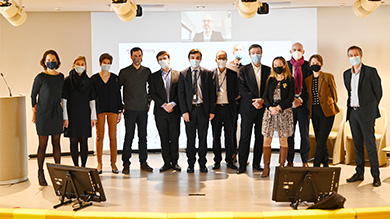The X-HEC Chair is designed to support the development of data culture and use, which are crucial in reinventing the bank of tomorrow. Data – as used in data science algorithms – contribute to improving banks’ operational efficiency and developing new value-added services. Meanwhile, this chair is an opportunity for students to look at real use cases and have discussions with Natixis’ experts from across a wide range of business sectors i.e. corporate & investment banking, asset management, payments, risks, etc.
Caption (left to right in the picture): Romain Besombes, Master’s student in Data Science For Business at École Polytechnique / HEC Paris and intern at Natixis Payments; Theo Lopès-Quintas and Narjess Cheikh, data scientists at Natixis Payments
Romain Besombes was part of the student team working on the payments case, and here he tells us all about his experience of the challenge, from preparation through to completion. Find out more about this rewarding project in his video: “We were able to benefit from teams’ technical, scientific and business expertise at Natixis Payments and Dalenys, as they managed us during the challenge. I found this challenge really interesting as it is truly a theme of the moment.”
Getting to grips with reality in the challenge
Fraud detection is a crucial priority for Natixis in ensuring maximum security for clients, particularly across the payments chain, but just what practical steps does it involve? In January 2021, students took part in the X-HEC Chair payments challenge and contributed to the development of a scoring tool1 based on algorithms that detect fraud in real time. Théo Lopès-Quintas and Narjess Cheikh, data scientists at Natixis Payments, supported challenge teams and here share their feedback on the experience.
Théo Lopès-Quintas believes that the challenge is mutually beneficial: “when we work with talented students, they bring a fresh view to the issues we face on a daily basis, so we are mutually challenged by this experience!”. Narjess Cheikh highlights the importance of bringing a concrete and real dimension to students: “when training to be a data scientist, it is crucial to be able to look at real business cases, and this is exactly what students did during the challenge: they were also able to talk directly to experts at Natixis Payments and Dalenys”.
The subject of the Payments challenge is very much a topic of the moment – identifying any transactions that could lead to fraud before an authentication exemption is granted or refused. The challenge involves two major aspects i.e. ensuring total security for clients and finalizing the transaction for merchants. Students worked with data from fintech Dalenys, which specializes in payment solutions for e-commerce, franchise networks and marketplaces.
Highly motivated students
Preparations for the challenge involved “setting out a clear and extensive topic, but one that was sufficiently straightforward to be addressed over a period of two weeks” notes Théo. This required close cooperation between teams at Natixis Payments and Dalenys. Meanwhile, Narjess highlights the lengthy process to “extract useful and anonymized data to provide a challenge that would be beneficial for both students and clients”.
Participants met with experts at Natixis Payments and Dalenys during two Q&A sessions, and Narjess states “during these high-quality discussions, future data scientists gain a fresh view of current issues”. These sessions also provided scope for additional discussions between students and teams, with a continued focus on looking for optimum solutions for clients, consumers and merchants.
To conclude, Théo Lopès-Quintas states “our challenge was to clearly set out the rules and ensure that students distinctly understand our various business needs”. As Narjess Cheikh adds “successfully improving analysis capabilities to identify potential fraudulent features of each transaction clearly demonstrates the relevance of this chair”. A collective success from preparation through to implementation to use!
1 Score given to a transaction estimating the likelihood that it is fraudulent (via machine learning)














